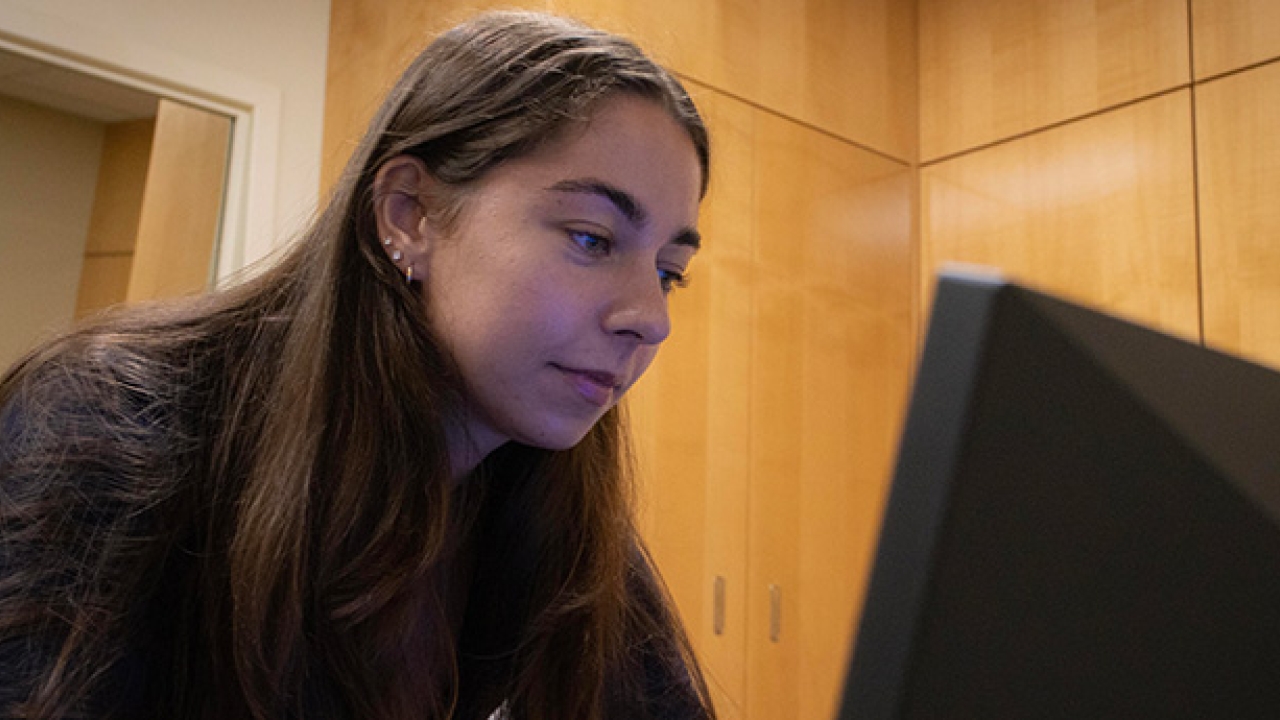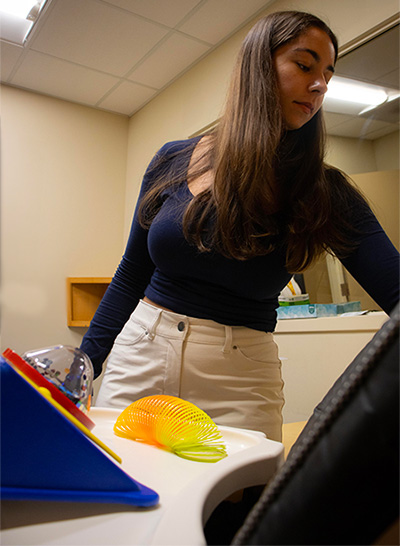
MIND Institute junior specialist receives Autism Science Foundation post-undergraduate award
Sarah Bayoumi will research eating difficulties in autism and ADHD
Originally Posted by UC Davis Health
By Marianne Russ Sharp
The UC Davis MIND Institute’s Sarah Bayoumi has been awarded an Autism Science Foundation fellowship to study the challenges that many autistic individuals experience at mealtimes. The post-undergraduate fellowship will fund Bayoumi’s research for two years.

Bayoumi is a research coordinator in the lab of Meghan Miller, an associate professor in the Department of Psychiatry and Behavioral Sciences and a MIND Institute faculty member.
“I was so excited when I got the news about the fellowship,” Bayoumi said. “I hope this work will give insight into the sensory mechanisms behind feeding and eating difficulties in early life and help lead to early interventions to help children with these challenges.”
Eating difficulties can include a very limited diet, refusing to eat or eating too much, or self-harming behaviors during mealtime. Individuals may also prefer specific mealtime routines, like always needing to sit in the same seat at the table. Those with limited diets might refuse to eat fruits and vegetables or only eat food from specific brands. This can be stressful for individuals and their families and contribute to malnutrition, constipation and other stomach issues.
Up to 88% of autistic children, and about 17% of children with attention-deficit/hyperactivity disorder (ADHD) experience eating difficulties, compared to less than 5% of typically developing children.
“Despite these staggering numbers, little is known about the reasons behind them and how they can be identified early in life,” Bayoumi explained. She will study whether there are distinct eating profiles associated with autism or ADHD and whether recognizing these in infants may help lead to earlier diagnosis.

Bayoumi will also spend time at the MIND Institute’s clinic for patients with feeding challenges and build leadership skills. “The goal is to give Sarah a range of learning opportunities to help her on the path to graduate study in clinical psychology with a focus on autism,” explained Miller, who will serve as a primary mentor.
Two additional mentors will assist Miller: MIND Institute postdoctoral researcher Girija Kadlaskar and Heather Thompson, chair of the Department of Communication Sciences and Disorders at Sacramento State University.
Bayoumi’s research is folded into a long-term study Miller is doing on early signs of autism and ADHD. The team gathers information about babies’ attention, language and social skills. They also assess feeding and sensory issues. In addition, Bayoumi will collect information from caregivers about their child’s eating habits at age 3.
I hope this work will give insight into the sensory mechanisms behind feeding and eating difficulties in early life and help lead to early interventions to help children with these challenges.”
—Sarah Bayoumi, junior specialist, UC Davis MIND Institute
An opportunity to expand her research
The topic is not new for Bayoumi, who graduated from UC Berkeley last year as the top psychology student in her undergraduate class. She studied eating difficulties in adults with autism or ADHD for her undergraduate honors thesis, collecting surveys from more than 1,500 people. She found that eating difficulties were often related to traits of both autism and ADHD.
“My honors thesis sparked many of the questions that motivated this project,” Bayoumi said. “Why do some neurodivergent individuals have eating difficulties and others don’t? How can these be found earlier so that people can get the support they need sooner?”
Bayoumi also researched a related topic as a MIND Institute RISE-UP scholar in 2022. During the six-week undergraduate research program she studied sensory differences in infants more likely to develop autism or ADHD.
“Sarah’s enthusiasm, dedication and intellectual curiosity make her an excellent candidate for this fellowship,” Kadlaskar said. “She’s well-positioned to make valuable contributions to not only the research project, but the greater scientific community.”
The nonprofit Autism Science Foundation supports autism research by funding scientists and organizations researching autism.
The UC Davis MIND Institute in Sacramento, Calif. was founded in 1998 as a unique interdisciplinary research center where families, community leaders, researchers, clinicians and volunteers work together toward a common goal: researching causes, treatments and potential prevention of challenges associated with neurodevelopmental disabilities. The institute has major research efforts in autism, fragile X syndrome, chromosome 22q11.2 deletion syndrome, attention-deficit/hyperactivity disorder (ADHD) and Down syndrome. More information about the institute and its Distinguished Lecturer Series, including previous presentations in this series, is available on the Web at mindinstitute.ucdavis.edu.
Media Resources
Marianne Russ Sharp
marsharp@ucdavis.edu
Phone: 916-734-9118
